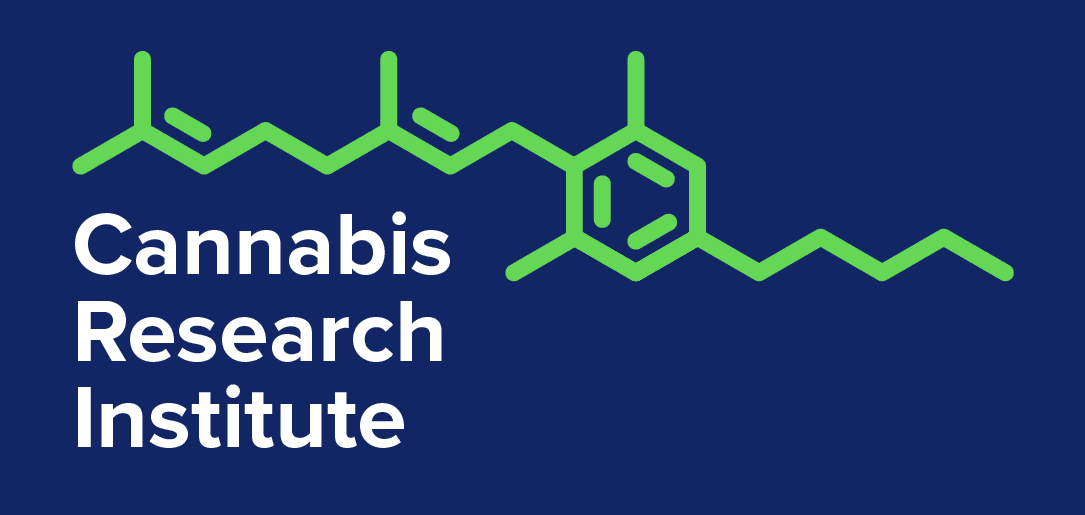 Cannabis Research Institute logo.
Cannabis Research Institute logo.
After its formal launch in November, the Cannabis Research Institute is now headed into Year 2.
On the cusp of that milestone, Director Reggie Gaudino, his team, and their collaborators hosted a virtual town hall June 12. The event offered an opportunity to get to know the institute and its collaborators, with the goal of coordinating communication and building relationships with faculty, staff, and campus units across the University of Illinois System. Through prepared remarks and audience Q&A, CRI gave a sense of the directions in which it’s growing.
Growing community
Benjamin Shaw, division director and professor of community health sciences in UIC’s School of Public Health, is helping CRI develop an infrastructure for community engagement, ensuring the institute’s work is “meaningful to communities and residents of Illinois across the state,” and centering perspectives of those who have been excluded from research and harmed by criminalization.
Among Shaw’s charges is the creation of a Community Advisory Board (CAB), representing not just academia, but members of communities across Illinois. In addition to determining research priorities, the CAB would also help disseminate the research and administer seed funding.
Gaudino is aware that what scientists think is important will not always be what the community thinks is important. Getting broad community feedback will “help us not be tone-deaf,” he said.
CRI held its first community listening session June 24 and plans to hold two more this summer, along with an in-person symposium. Anyone interested in participating should email uiccri@uic.edu.
Growing diversity
As a researcher, Gaudino values science. But he also understands that who does that science matters. It’s important, he said, for students in urban communities that have been harmed by criminalization to “see people who look like them doing that work.”
Growing ideas
Illinois is a significant agricultural research state, Gaudino says, but it ranks toward the bottom in hemp research. He’d like to change that, so that “Illinois is recognized as the go-to place for cannabis research.”
Among his current projects are one with the cancer biology program at NIU and another with UIC medical researchers on pain mitigation for sickle cell and endometriosis.
“We really do value collaboration,” said Gaudino, a molecular geneticist with decades of experience in cannabis research, “and are looking to actively build relationships so we can expand where and how hemp research is done.”
Though it did not come up in the town hall, CRI researchers have already published a paper about HLVD, which affects cannabis plants, highlighting a successful method to eradicate the virus.
Growing awareness
Another CRI collaborator, James Swartz, interim associate dean for research and professor at UIC’s Jane Addams College of Social Work, and his team are evaluating the public health effects of cannabis as dictated by Illinois’ 2019 Cannabis Regulation and Tax Act.
Swartz’s first challenge: given the limited research allowed on a Schedule I drug, “there was no blueprint for what ‘public health effects’ meant.” Looking at data from Colorado, California, Washington, where cannabis has been legal for longer, his team is casting a wide net, examining arrests, use among minorities and underrepresented people, perinatal use, pediatric poisoning, CUD, traffic fatalities, and early onset psychosis, among other outcomes, while also considering the use of hemp-derived products like delta-8 as opposed to cannabis.
Growth challenges
Gaudino said the biggest challenge in standing up the institute was “my own lack of knowledge of university policies and practices.” Developing relationships with state agencies and other campuses has taken time.
Christina Sansone, CRI’s senior program manager, cited another challenge: misinformation, intentional and otherwise, around cannabis specifically and substance use generally.
Budding partnerships
But regardless of the challenges, Gaudino is excited by the possibilities ahead.
“Cannabis research, by its very nature, is interdisciplinary,” Gaudino said. In addition to biology, chemistry, and neuroscience/psychology, cannabis and its history also intersect with law, economics, political science, and more. As a result, he has welcomed, and will continue to welcome, research collaborators.
Entomologists Brian Allan and Esther Ndumi Ngumbi of UIUC contacted Gaudino, interested in a project focused on ecological interactions between insects, some arthropods, and cannabis plants. CRI has also been talking to faculty from UIC’s law school about potential projects that will eventually “create additional synergy for everyone,” Sansone said. Even during the town hall, an attendee from UIC’s College of Dentistry posted to the chat that they wanted to connect CRI with researchers who study periodontal disease through saliva samples and RNA.
“If we stop thinking about hemp and cannabis as THC and CBD and we look at it for the potential that it offers,” he said, “there’s not a limitation on the types of research that can be done. Let’s start talking about ways that we can do hemp research benefits both your discipline and basic science.”
Spotlight Series launches
As part of its mission to inform both academia and the general public, and to highlight the work of cannabis researchers beyond the institute, CRI will host a Spotlight Series. The first event will feature Israel Gasperin, founder of Zentrela, a company focused on using AI to analyze EEG data and understand the psychoactive effects of cannabis.
“Quantifying the High – EEG, Machine Learning, and the Future of Cannabis Research
July 17
11 a.m. CDT
Register for the zoom session.
Author: Jeanie Chung